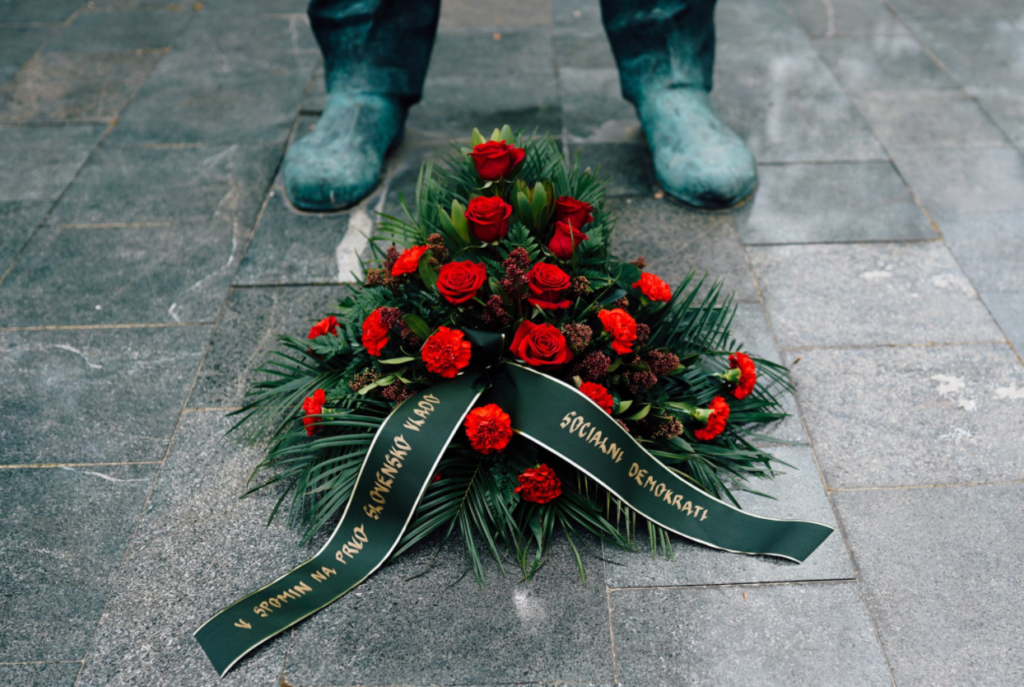“I have no problem with the double standards being a standard for private media outlets. It is up to the owner of the media to decide whether such policies are supported or not. However, a serious problem arises if double standards of reporting are present in state-owned media outlets, such as RTV Slovenia or the Slovenian Press Agency,” Jože Biščak, president of the Slovenian Association of Patriotic Journalists, commented on the double standards which recently became very obvious again. Namely, Die Presse wrote about Tanja Fajon laying a wreath in front of the memorial of the communist Boris Kidrič, who was guilty of serious crimes after 1945 – and the mainstream media are diligently staying silent about this. Is this another in the series of confirmations that Slovenian journalists who work for the mainstream media operate as a “media cartel in the service of the former regime”?
The journalist of the Austrian Die Presse dedicated part of his article to the leader of the Slovenian Social Democrats, Tanja Fajon. He wrote that the photos Fajon posted on Twitter on the 5th of May 2020 were completely authentic. And that we can clearly see in the photos that Fajon laid a wreath in front of the memorial to the communist Boris Kidrič, who was guilty of serious crimes after the year 1945, especially during the expulsion of the Germans. “European Commissioner Timmermans was so outraged that Ljubljana dared to show him these photos of his comrade that he boycotted a group photoshoot with the conservative Slovenian
Prime Minister Janez Janša. What a pity,” Schwartz, who otherwise wrote about how far-reaching the consequences of misinterpreted photographs can be, added with a hint of cynicism.
Of course, our mainstream media outlets showed no signs of hearing about this – unlike, for example, in March, when practically everyone wrote about how Die Presse published an article about the “Slovenian patient,” which is what one of their journalists called Prime Minister Janez Janša. “Slovenian Prime Minister is the subject of critical writing in several European media outlets,” read the headlines from the mainstream media, while they diligently remained silent about the much more realistic criticism of Fajon.
The president of the Slovenian Association of Patriotic Journalists, Jože Biščak, reminded everyone of the Nobel laureate named Friedrich von Hayek, who is one of the most cited economists of all time. His insightful statement about how socialists would not be socialists if they actually familiarised themselves with the economy, has become the source material for several more or less imaginative quotes of the same style. And one that is very popular at the moment reads: “If the leftists did not have double standards, they would not have standards at all.” Biščak found this to be quite true, and it does not only apply to left-wing politicians but also to the mainstream media – perhaps even more so. The editor-in-chief of the Demokracija magazine emphasised that he had no problems with double standards when it comes to the privately-owned media outlets. After all, it is up to the owner of the media outlet to decide whether such policies are supported or not. However, a serious problem arises if double standards in reporting are present in state-owned media outlets, such as RTV Slovenia or the Slovenian Press Agency.
According to Biščak, a typical example of this is reporting on the work of the centre-right government and Prime Minister Janez Janša, where journalists and editors who are paid from the mandatory contributions of the taxpayers, are fully aware of their choices and deliberately decide for a negative selection of news or events on which to report. Namely, they only choose those where either the domestic or foreign media write negatively about the Prime Minister or about the conservative (right-wing) worldview.
Biščak also pointed out that a similar thing applies when it comes to the selection of news or events from abroad. For example, when Fidezs’s MEP József Szájer was involved in a “sex scandal,” the Slovenian media outlets could not stop reporting on the fact that he was a close associate of Viktor Orban. Today, a much bigger scandal is being reported on in Hungary – namely, the Alliance of Liberals and Democrats MEP, Katalin Cseh, is involved in a major international corruption scandal, in which millions of euros of taxpayers’ money have disappeared – but the Slovenian mainstream media outlets have not reported on it. “There are countless examples of double standards: from the fact that leftist protests are “peaceful” (even if a photographer or a cameraman is hurt in the process), while the right-wing protests are described as neo-Nazi and violent (even if the protester only show a banner that reads “Stop anarchy”), to how they justify their violence, saying that these are, in fact, acts of justice,” Biščak added.
Sara Bertoncelj


